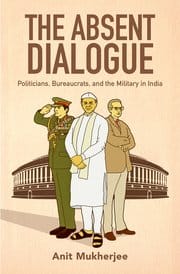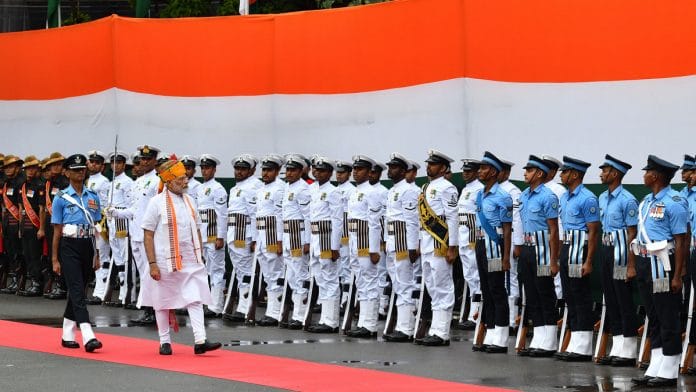What are the typical motivations of politicians, bureaucrats, and the military officers on the subject of civil–military relations? The following is an analysis of these three disparate actors in contemporary India.
Political Control
For the most part, it appears that politicians are largely content with exercising control over the military without attempting to reshape it from the perspective of effectiveness or efficiency. To be sure, the enormous defense outlays, as a proportion of central government expenditure (12% in financial year 2018–2019), evoke their interest in reducing the budget; however, without dramatically reshaping the military, this cannot be done. Since politicians lack expertise, it appears that politicians are have been content with the formal exercise of civilian control and preventing allegations of corruption in the defense sector.
Bureaucratic Control
The civilian bureaucracy in India has been an important element in the exercise of civilian control. They not only uphold their constitutional duties but also are an important source of checks and balances by providing advice to politicians on various proposals emanating from the military. However, civilian control has become a goal in itself and is used as a pretext to avoid “second-order” discussions on effectiveness and efficiency. A former defense secretary justified strong procedural control on the military as, in his opinion, in the coalition era, the polity is weak. “If we [civilian bureaucrats] do not do so,” he argued, “the military will gradually defy civilian control.” Those sympathetic to such views dismiss comparisons with Western democracies and instead cite the experience of the “near neighborhood”—Pakistan, Bangladesh, Myanmar, Thailand, among others, all of which have struggled to control their military. Such sentiments also explain the hesitation in creating the post of a CDS (or PCOSC) as they are fearful that this will diminish the institutional powers of the civilians. These fears resonate to an extent within India’s polity and some sections of Indian bureaucracy including intelligence agencies, police forces, etc.
Critics, however, dismiss such apprehensions and blame the bureaucrats for molding “the political leadership’s thought process according to their own perceptions on governance and administration.” This is the crux of the civil–military problem—while bureaucrats argue that they deliver professional advice, the military perceives this both as an unwanted intrusion and as unprofessional.
Civilian bureaucrats have also been the traditional bugbear for many in the Indian military.
At the same time, the bureaucracy has been complacent and has allowed a trust deficit to creep into its relationship with the military. It should have been more attuned to the bitterness that had crept into the military due to the disputes arising from successive pay commissions and a seemingly callous attitude toward veterans, including those with disabilities. As noted by a defense journalist, the armed forces “do not have faith in the civilian dispensation—largely the bureaucracy.” To a significant extent, this is because of the rotational nature of the job—bureaucrats may assume important posts with no experience in the MoD and therefore little knowledge of underlying issues.
Some also argue that civilian bureaucrats oppose any changes in the status quo. After his resignation, former naval chief Admiral D. K. Joshi hinted at this when he argued that “vested interests” have stalled defense reforms. When pressed further, he added, “vested interests . . . are the ones who wield the authority without accountability.” For members of the strategic community this was an indication that the opposition had come from civilians in the MoD.
Also read: Why Modi govt only boasts about surgical strikes on national security front
Military’s Quest for Maximum Autonomy
The military most often complains about the kind of civilian control exercised in India but paradoxically enjoys the autonomy afforded under this model. Civilian intervention or joint civilian and military deliberation upon the minutiae of defense policy would make most members of the military uncomfortable. The fact is that the military finds the current single-service approach convenient. It is not surprising therefore that the service chiefs oppose the creation of an empowered CDS or PCOSC. In addition, the services are bitterly divided over the model of jointness that they would like to follow—disagreeing over the need to establish theater and functional commands.
The military’s preference for autonomy comes across clearly in its Joint Doctrine, which was unveiled in April 2017. Curiously for a doctrine, publicly released by the three service chiefs, it had a short section on civil–military relations, which crisply captured the military’s perspectives. Making clear its preference for autonomy, the doctrine argues that civilians (in consultation with the military) should decide upon the military objective “and then leave it to the military professionals to decide upon the best way of achieving the objective.” This is a classic exposition of Huntington’s “objective control” model, which presupposes that military autonomy maximizes effectiveness. However, as the academic literature readily admits, this not only is false and overly simplistic but misunderstands the purpose and nature of warfare. As pointed out by Srinath Raghavan, “On one hand the military wants greater say in policy matters, but on the other it wants to keep the civilians out of its domain.”
Also read: Not even 1% of Indian MPs have served in the military. And that’s concerning
Conclusion
Tensions between civilians and the military are not new in India. However, like in many other fields, the proliferation and reach of social media have only served to amplify differences. Instant opinions, traditional and non-traditional news media, and the emergence of the veteran community as a semi-organized lobby have exacerbated tensions and added to the pressure—on both civilians and the military. The underlying reason for these crises is that the military had lost faith in the bureaucracy’s role as an honest interlocutor. Embittered by past experiences and a feeling that their grievances have been ignored, the military has increasingly adopted an uncharacteristically strong stance. As a result, one would expect continuing tensions and crises between the two.
The contemporary trend in India’s civil–military relations is clear—politicians, largely, refuse to intervene in those matters which are considered to be in the military’s domain. Civilian bureaucrats in the MoD lack expertise and therefore by norm do not engage with the military on professional matters. This arrangement leaves the “army, navy and air force chiefs the unfettered right to run their services as they deem fit; while the ministry controls the money and procures military equipment . . . [indicating] abdication of ministerial responsibility.”
At the same time, as the military functions as “attached offices” to the ministry, all proposals have to be cleared by the latter. This bestows considerable decision-making powers on the bureaucrats. In addition, while careful not to interfere in the military’s domain, civilians are vigilant to any perceived threat to civilian control. Such an arrangement “keeps the armed forces headquarters separate from the Ministry of Defence [and] has encouraged an adversarial relationship between the military leadership and the bureaucrats in the Ministry of Defence.” There are structural problems causing constant civil–military tensions, which cannot be wished away without changes in institutional design. However, such reforms are unlikely as political leaders are sanguine about the current model and would prefer strong civilian control over effectiveness. Moreover, this arrangement—despite occasional complaints—is convenient for all the stakeholders, and there is little appetite for change.
 This excerpt from The Absent Dialogue: Politicians, Bureaucrats, and the Military in India has been published with permission from Oxford University Press.
This excerpt from The Absent Dialogue: Politicians, Bureaucrats, and the Military in India has been published with permission from Oxford University Press.







No agency should have a free hand, checks and balances are required at all levels for an efficient and corruption free, result oriented functioning. Politicians being the power centre should play a neutral role with no partiality, giving respect to the domain expertise of beauracrats and military in their own areas of responsibility. Writing a strong dissent note may be easier at times but suggesting a solution and taking ownership is the need of the hour. Hope better sense prevail!
One should guard zealously against the politicisation of the armed forces. Deep selection is the thin edge of the wedge. 2. It is unfair to the mandarins in MoD to suggest they do not know their onions. One has to read their notes of dissent on important deals to recognise that they are officers of great caliber and integrity.